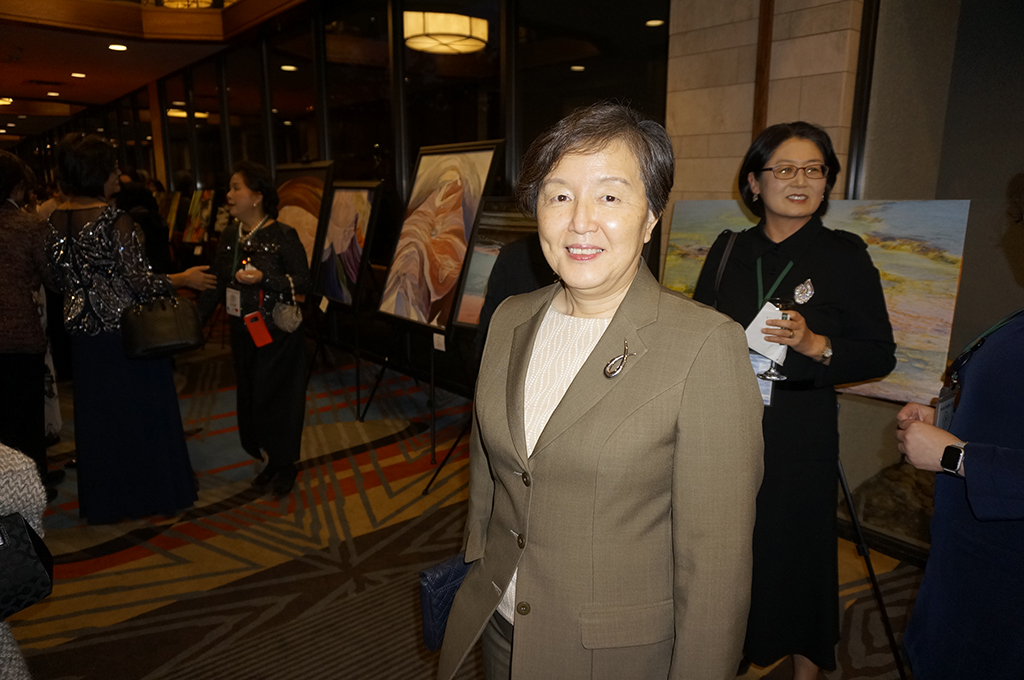By Assunta Ng
NORTHWEST ASIAN WEEKLY

Madame President Heisook Kim (Photo by George Liu)
In a bustling crowd, women in glittering gowns and tailored dresses, outnumbering men, were nibbling appetizers, chatting, and laughing as if they were sisters. But they were not relatives, they were Ewha Womans University alumni from all over North America, gathered at the Bellevue Hilton Hotel on Oct. 26, for their reunion.
Ewha is the world’s largest women’s college in South Korea, with an enrollment of over 20,000 students. (At the time, it was acceptable to call it ‘Womans’ instead of ‘Women’s’ university.) The largest women’s college in the United States, Wellesley, has only about 2,000 students. If you Google Ewha, you will see the university is like a mini city, with more than 8l buildings, and it is still growing.

Attendees of the Oct. 26 reunion at the Bellevue Hilton. (Photo by George Liu)
Founded in 1886 by American missionary Mary F. Scranton, she began classes for a single student at her home. Thus, began “a major turning point in the history of women in Korea,” according to “Ehwa: An Invitation,” a book on Ehwa’s history. Under the patriarchal system, women in traditional Korean society were not supposed to have names, nor were they allowed to leave the house freely.
However, Christian values had centered on the “humanization of women,” which the school had pursued since the last century.
I couldn’t believe Professor Donald Hellmann of the University of Washington (UW) was at Ewha’s reunion. He said Ewha and the UW would work on an agreement for exchange programs. Soon, a woman roamed into the hallway, the only one not dressed in fancy clothes, but in a plain pantsuit. There was an air of dignity and an indescribable quality and force about her. I was surprised and humbled when we were introduced…Madame President Heisook Kim. An unexpected honor, I am always thrilled to meet leaders who are women.
Clark Sorensen, UW professor of Center for Korea Studies, said Kim “is an important ambassador for Korea to the world and a key player in the internationalization of women’s education.”

UW Professor Donald Hellmann with EWHA President Heisook Kim (3rd from left) and alumni. (Photo by George Liu)
What is unusual about Kim, 64, was she was voted in by Ewha students, said alum Seungja Song. Later, board of trustees appointed Kim in 2017. UW trustees interview and select their president every time. Also, faculty and staff voted for Kim. She received more than 57 percent of the vote.
Kim, a former philosophy professor for over three decades, also received her undergraduate degree in English literature at Ewha. Her doctorate degree was from the University of Chicago.
Kim said Ehwa’s goal is to “prepare and fight for women to participate” in society, as South Korea is still being intertwined in Confucian social prejudice towards women.
“President Kim is a very warm person,” Song said. “She realizes her responsibilities and always encourages women to participate in diverse fields and challenges. She helps a lot of women.”
Proud of Ewha’s work of developing female pioneers, Kim mentioned judges, the first female prime minister although being impeached, the former president of Korea Times, and Yun Jung Ok, the first person who spoke publicly in 1990 about “comfort women” who were enslaved and sexually exploited for the Japanese military.
Kim, who visited Seattle for the first time last week, gave a lecture at the UW and met with other officials.
Ewha’s reunion was a four-day affair, featuring dinners, talent shows, and singing, violin, cello, and piano performances. Dr. L. Monika Moskal of the UW School of Environment and Forest Sciences gave the keynote speech to tie in with Ewha’s theme, “Go Green.” Over 300 people attended the reunion.
Assunta can be reached at assunta@nwasianweekly.com.

